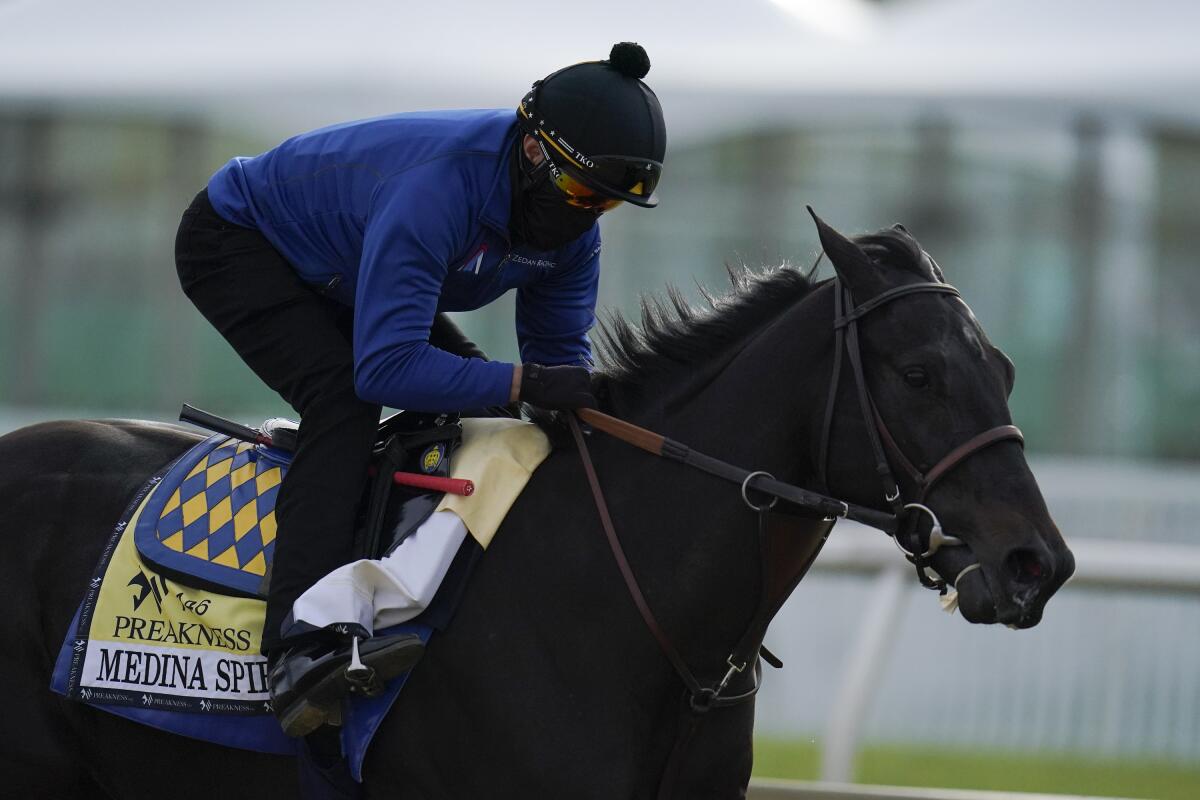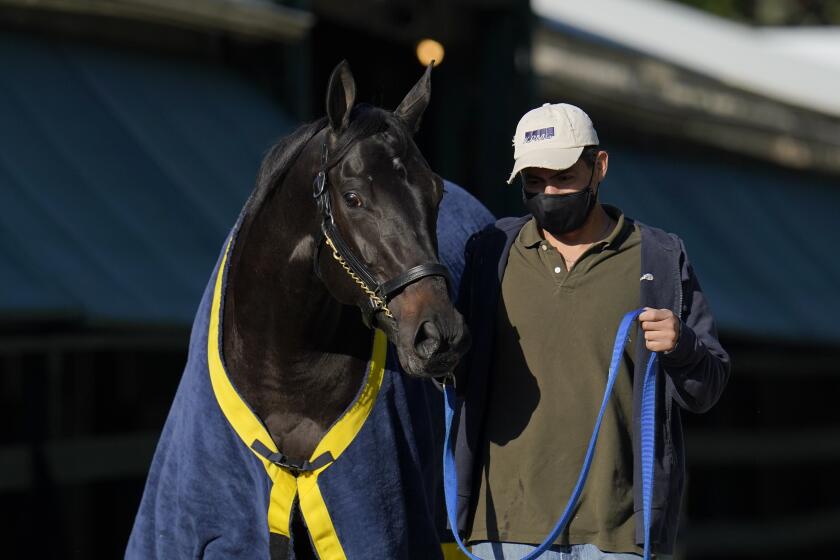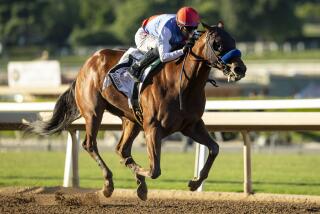All horses, including Kentucky Derby winner Medina Spirit, cleared to run Preakness

BALTIMORE — Bob Baffert is the most recognizable person in horse racing. His unbridled success mixed with a folksy charm and near unlimited media accessibility has served him well. Until now.
The Hall of Fame trainer has found himself enmeshed in a scandal that cuts to the core of why some people hate horse racing: drugs. Medina Spirit, winner of this year’s Kentucky Derby, had tested positive for a legal medication that is not considered performance enhancing. It’s just not legal on race day.
Medina Spirit is back racing Saturday as the favorite in the 146th Preakness Stakes, the second leg of the Triple Crown. He and stablemates Concert Tour, Beautiful Gift and Hozier had to undergo pre-race screenings for prohibited substances. The horses all passed. Beautiful Gift finished seventh as the favorite in Friday’s Black-Eyed Susan Stakes.
Concert Tour is the second favorite in the Preakness. And Hozier, who underwent only routine screening, is the favorite in the Sir Barton Stakes.
The biggest unanswered question is if Medina Spirit will remain the winner of the Kentucky Derby and that won’t be answered for quite some time pending appeals and court action.
What makes this violation different is it happened on the biggest stage the sport has to offer. And, for the first time, Baffert has gone silent after an initial flurry of media appearances. Baffert declined a request from The Times to be interviewed.
“I have shut everything down until after the race,” Baffert said by text Wednesday while traveling commercially from Louisville to Los Angeles through Dallas. He lives in La Cañada and primarily trains in Southern California.
Concert Tour is atop the final Preakness rankings.
“Everything aligned to make this a huge story because it happened in the one race the secular world knows,” said John Sadler, a top trainer in Southern California. “It happened to be the Derby, it happened to be Baffert and it happened in the largest attended sporting event since the start of the pandemic.”
Sadler, while taking a wait-and-see attitude, is one of the few trainers who would speak on this issue. The Times contacted multiple current trainers, including two former Baffert assistants, and was greeted with either no thanks or no response.
The industry has circled the wagons, not around Baffert but way off to the side.
Detractors are easier to find.
“Baffert has abused his position and flaunted it,” said Barry Irwin, owner of Team Valor and owner/breeder of Animal Kingdom, winner of the 2011 Kentucky Derby. “He thinks he’s bigger than the game and we’re about to find out if he is. And he could be.”
The story line about this Preakness is more about Baffert, who chose not to come to avoid being a distraction, than the horses who are running.
After the Kentucky Derby, the 3-year-old colt winner received a positive finding for betamethasone, a corticosteroid that is used to treat inflammation. Baffert initially said the horse had never been treated with the medication but two days later said an investigation showed the horse had been treated for almost a month with an ointment that contained betamethasone for a skin rash.
“The atmosphere is a little bit down,” said Wayne Lukas, a longtime Baffert friend and trainer who will start Ram in the race. “It just doesn’t have that feel. There’s no excitement in the air. I think horse racing took a hell of a hit with the Derby situation. It’s hard to overcome that.”
Horse racing has been at a crossroads since the spike in fatalities at Santa Anita in 2019. It has spurred a series of safety reforms and spawned the passage of the Horseracing Integrity and Safety Act. It is supposed to standardize safety and medication regulations nationwide by the summer of next year.
“Racing’s life might be like Christianity,” Irwin said. “It needs to die before it’s reborn. We’re getting to that point. It looks like we are dying on a certain level. … Any time a guy keeps doing [violations] serially, it’s not a good thing.”

Baffert’s success might also be a detriment. Very few are neutral on the trainer known for his white hair and tinted glasses.
“It’s not clear [how much it has hurt the sport],” said David Carter, the principal of the Sports Business Group and associate professor of sports business at the USC Marshall School of Business. “We love a villain that we can root against. The white hair wears a black hat.
“Success can breed contempt. You see a guy win more Derbies, then the chatter and perception is there might be something going on. People believe where there is smoke there is fire.”
Taken individually, Baffert’s five most recent violations have plausible explanations. But taken collectively, the whole has a feel that is greater than the sum of the parts.
- In May of last year, Charlatan and Gamine were disqualified and Baffert hit with a suspension when they tested positive for lidocaine on Arkansas Derby day. The disqualification and suspension were overturned when a case was made for contamination and horses outside Baffert’s barn also tested positive.
- In July, Merneith tested positive for dextrorphan, a common ingredient in cough medicine. Baffert said the horse ate hay that was contaminated by a groom urinating in a stall. Baffert was fined $2,500 in November.
- In September, Gamine was disqualified after a third-place finish in the Kentucky Oaks, having tested positive for betamethasone. The withdrawal period is 14 days for the drug and Baffert said the filly was last administered it 18 days before the race. The disqualification stood and Baffert was fined $1,500.
It’s been reported by the Louisville Courier Journal and New York Times that Baffert had at least 30 previous medication violations over a 46-year career. There is no common database that tracks violations. Craig Robertson, Baffert’s attorney, disputes those numbers and says that many of the violations are “minor issues related to overages of allowable medications.”
Robertson said Baffert has been suspended twice, in 1977 and 1992.
“The way to fix the thing that’s happening in horse racing is to cut the head off the snake,” said Mick Ruis, a former trainer and now owner and breeder. “It’s so obvious. Time after time it’s not his fault. It’s just disheartening. Why would people want to be betting on horses when there are allegations and there is a real positive and he’s getting off on technicalities.”
If Medina Spirit wins Saturday, the controversy will live on as the horse goes to the Belmont Stakes in three weeks for what certainly would be a contested Triple Crown. If the horse loses, it will be said it’s because the horse didn’t have the extra drug advantage.
“I think [Baffert] will always be scrutinized beyond the reality of the whole situation and that people will be critical of him,” said Lukas, who has won 14 Triple Crown races. “I think he’ll have to overcome a certain stigma that is going to follow him around for a while.”
Baffert has not been charged with anything in regards to Medina Spirit, although Churchill Downs has barred the trainer from racing.
“It can’t be good for anyone’s reputation,” said Aidan Butler, chief operating officer of the Stronach Group, which runs Pimlico, Santa Anita and other tracks. “I just hope people will wait. Last time I checked you are innocent until proven guilty. You’re not guilty until proven innocent. And for us, we set up these protocols he has to follow. As long as he’s clean, he’s good to race.”
That moment will come at 6:47 p.m. in Baltimore.
More to Read
Go beyond the scoreboard
Get the latest on L.A.'s teams in the daily Sports Report newsletter.
You may occasionally receive promotional content from the Los Angeles Times.












